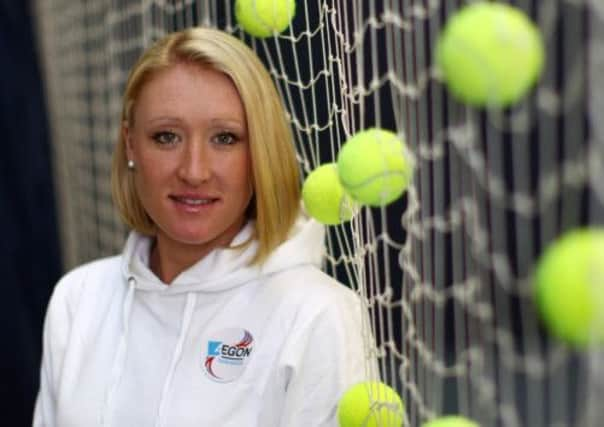Elena Baltacha announces retirement from tennis


Like Murray, Baltacha was catapulted to an unreal level of fame by dint of an inspired run at Wimbledon early in her career. Back in 2002, British tennis fans were desperately searching for a new Jo Durie, if not a new Virginia Wade – a female accompaniment to the Henman/Rusedski show.
When Baltacha, an 18-year-old, bespectacled and audibly Scottish wildcard entry in the women’s singles, defeated Maria Vento-Kabchi and Amanda Coetzer to reach the third round, it would have seemed ludicrous to predict that, in a Wimbledon context at least, this would be as good as it would get.
Advertisement
Hide AdAdvertisement
Hide AdMurray, elder brother of Andy, enjoyed a similar premature profile promotion five years later with his mixed-doubles triumph alongside Jelena Jankovic.
Baltacha’s Twitter biography leads with the line that she was British No 1 for 132 weeks between December 2009 and June 2012, and it is in that kind of context that her career should be appraised. It was cruel providence, rather than any self-inflicted wastage of talent, that prevented her doing more at Grand Slam level in the past 11 years, as illness and injury inflicted upon her challenges tougher than anything she encountered under the banner of the ITF.
Baltacha, daughter of the former Soviet Union, St Johnstone and Inverness footballer, Sergei, and Olga – a Ukrainian Olympic heptathlete – was still only 19 when she was diagnosed with primary sclerosing cholangitis, a liver condition that targets the immune system, and underwent invasive surgery at the end of the 2003 season.
It was remarkable to see her reappear the following January and go on to win another first-round match at Wimbledon, before losing to Jennifer Capriati, then reappear at the 2005 Australian Open and win all three of her qualifying matches then two matches in the main draw.
Only a cold heart could begrudge her the joys of 2010, when she basked in victories over Li Na and Francesca Schiavone, the reigning French Open champion, Now 27, she broke into the world’s top 50 for the first and only time that September, and in 2011 she won the most prestigious of her 11 ITF titles, the Aegon Nottingham Challenge.
The Fed Cup was the other tournament in which Baltacha distinguished herself, a point pressed home yesterday by the British captain, Judy Murray. “Bally has been the most incredible ambassador for women’s tennis in Britain for the past 12 years. Her work ethic and competitive spirit are second to none,” said Murray. “If we could bottle those qualities, we would have many more top players.”
Baltacha herself, who promised to divert all her energies into the eponymous academy she has set up in Ipswich, added: “It just feels it’s the right time. I have had some amazing experiences through playing tennis – some incredible highs and some very low lows – and I wouldn’t change any of them but it’s time to move on.”